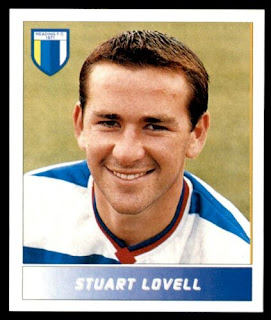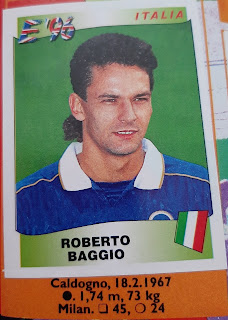221: Stuart Lovell, Reading, Panini Football League ‘96
Today Emlyn Jones brings us a story of a great footballing injustice which coloured both mine and his formative footballing years. Emlyn and I first met at the University of Exeter as residents of the prestigious Lafrowda halls but it was over a piss in a bush outside the pub my now wife worked at waiting for her shift to finish that we realised that we had lived almost parallel lives. It’s amazing how deep a friendship can be formed over a mutual dislike of Jason McAteer. Over to Emlyn.
In 1994 the relatively new Premier League held 22 teams. Apparently this was too bloated and the league needed to be stripped down to a leaner twenty sides by the start of the 1995/96 season. There were a number of ideas mooted for how to achieve this; relegate more teams? Restrict the number of promotions? Set up play-off games between the lowest top tier sides and the highest second tier?
In the end, the decision was made that four teams would be relegated from the Premier League, meaning that the team finishing in nineteenth, usually safe, would suffer relegation. It would be really annoying to finish in this position. Crystal Palace were the unfortunate side, despite a strong squad, and fellow blogger Manny Hawks very sparingly mentions this event.
Meanwhile only two would be promoted from the then Division One. One way of doing this would have been to reward the two teams who finished highest and forego the playoffs for that season. Ever keen to have games such as this on Sky, the decision was made that the teams finishing between second and fifth would enter the play-offs. It would be really annoying to finish in second position.
As a Reading fan, watching us perform above expectations and finish in second position was fantastic, and without spoiling the latter half of this post, a bit of a swansong for a much loved team of players. The squad had performed above expectations after only being promoted having topped Division Two a season earlier. Instrumental in the rise had been top scorer for the surprise package Division One side, Stuart Lovell.
Lovell was born in Sydney, Australia, however, the wonderful weather and relaxed way of life clearly didn't appeal to his parents, who moved the young family to the equally salubrious surroundings of Reading. This would prove beneficial to young Stuart as he progressed through local youth sides to reach the senior Reading squad. His first three seasons yielded two, four and then eight goals, before the victorious Division Two campaign saw him notch twenty league goals in a partnership with veteran Jimmy Quinn, who managed forty himself that season. While both found it harder in Division One, both managed double figures, Lovell topping the charts with fourteen in all competitions.
As mentioned earlier (and very sparingly in conversations with Manny), despite having finished second, Reading were forced to partake in the play-offs. Lovell scored twice in the first leg of the semi-final as Reading took a 3-1 lead over Tranmere Rovers into the second leg, holding firm at 0-0 to reach the final at Wembley. Awaiting them was the side that finished a spot below them in the league, which would be outside the automatic spots in a standard season (unlike Reading), Bolton Wanderers.
Over 64,000 fans were in attendance and Reading got off to a dream start with Welsh duo Lee Nogan and Ady Williams putting them 2-0 up within thirteen minutes. Jason McAteer then committed a cynical foul, giving away a penalty. He should have been sent off too, but surely Lovell would put Reading three ahead and kill the game?
Sadly, Lovell's penalty, though well struck, was saved by Keith Branagan, and Lovell fired the rebound over from eight yards. He also struck a shot wide with minutes remaining in the half, but at 2-0 things still looked good for Reading. And still did until the 76th minute, when Owen Coyle pulled one back, before Fabian De Freitas equalised ten minutes later to send the game to extra time. A deflated Reading conceded to Mixu Paatelainen before De Freitas added another with two minutes to go. Lovell had missed a further two chances in between, and despite a Quinn goal with a minute to go, Bolton held out and won 4-3, winning promotion despite having finished outside what would usually have been automatic promotion spots. That's my major takeaway from the game, though checking the timings on Wikipedia did highlight a fact that had passed me by; reserve goalkeeper for Bolton was one Peter Shilton. Maybe if he'd have started Lovell's penalty would have gone in off Paul Parker or something.
In the aftermath, a number of the squad would move on, including totemic goalkeeper Shaka Hislop and midfielders Simon Osborn and Scott Taylor. The performances somewhat fell away the following season, eventually finishing in nineteenth position. Meanwhile, Bolton went on to finish bottom of the Premier League. Probably justice for the fact that they shouldn't have gone up in the first place. Lovell stayed, and played for a further three seasons in the second tier, however a cruciate ligament injury in 1997 saw him nearly forced to retire, and he moved on to Hibernian, then in the second tier of Scottish football.
Eleven goals saw him help the side to the Premier League, and he remained a regular for another two seasons, a third placed finish being rewarded with a call up to the Australia squad, for whom Lovell played two games. There followed a surprise move to newly promoted Livingston. A third place finish was a fine reward for the move, and in his third season with the club Lovell, having moved into a midfield role, captained the side as they beat his former side Hibernian to win the Scottish League Cup. After another season, Lovell moved on to Queen of the South for fifteen months, before retiring after a spell as caretaker manager.
Lovell is associated with some of the famous successes Reading had before finally reaching the Premier League in 2006, and is rightly also looked back on fondly by fans of all three Scottish sides he played for. He continues to carry out media work and has served as a representative of PFA Scotland. He also works with a company that tackles social exclusion using football to help integrate individuals into a team. Clearly a lovely bloke, and hopefully not too bitter about the fact that Reading should have been promoted in 1995 without having to play a bloody play-off. Bloody Jason McAteer.





Comments
Post a Comment